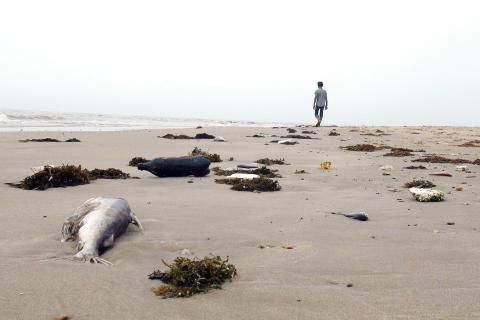Vietnam has told owners of a Taiwanese-built steel plant to dig up a controversial waste pipe, even after it found no evidence tying its discharge to mass fish deaths that have triggered health fears and public anger.
Huge numbers of dead fish have appeared at farms and on beaches in central Vietnam since April 6, affecting 200km of coastline, with no known cause of what the government is calling one of its worst-ever environmental disasters.
Vietnamese Minister of the Environment Tran Hong Ha declared illegal the waste pipe operated by Hung Nghiep Formosa Ha Tinh Corp, a unit of Formosa Plastics Group (台塑集團), after officials examined water samples around the site.

Photo: AFP
“We propose to have measures in place to monitor this system after it is elevated, for easy access and surveillance,” Ha told Formosa officials and reporters on Thursday.
Ha’s comments suggest the government still harbors doubts, despite tests that show Formosa, a major investor leading the US$10.6 billion steel project, was not behind the pollution.
Public outrage was also evident on social media, the only real channel through which Vietnamese get to vent in a country tightly controlled by the Vietnamese Communist Party.
In a statement yesterday, Ha said the government lacked experience in dealing with disasters and had been slow to act.
He called it a “very huge and serious environment disaster.”
The government has banned the sale and distribution of non-living aquatic products in four affected provinces.
Its probe said either toxic discharge caused by humans or “red tide,” when algae blooming at an abnormal rate produce toxins, may have killed the fish.
Facebook, which is used by about 30 million Vietnamese, is seeing an outpouring of anger directed at Formosa and criticism of the government’s sluggish response.
Many used the hashtag #toichonca, which means: “I choose fish.”
The hashtag emerged after a Taiwanese official at Formosa Ha Tinh said Vietnam had to choose between “catching fish and shrimp and building a modern steel industry.”
He later apologized.
In a government letter issued yesterday, Vietnamese Prime Minister Nguyen Xuan Phuc said authorities had yet to find the cause, and acknowledged public concerns.
Vietnam’s seafood exports, which totaled US$6.6 billion last year, will not be hurt, the industry’s body said. Top buyers are the US, Europe and Japan.
A petition on the White House Web site is urging US President Barack Obama to raise the issue with Vietnam’s leaders when he visits next month.

SEEKING CLARITY: Washington should not adopt measures that create uncertainties for ‘existing semiconductor investments,’ TSMC said referring to its US$165 billion in the US Taiwan Semiconductor Manufacturing Co (TSMC, 台積電) told the US that any future tariffs on Taiwanese semiconductors could reduce demand for chips and derail its pledge to increase its investment in Arizona. “New import restrictions could jeopardize current US leadership in the competitive technology industry and create uncertainties for many committed semiconductor capital projects in the US, including TSMC Arizona’s significant investment plan in Phoenix,” the chipmaker wrote in a letter to the US Department of Commerce. TSMC issued the warning in response to a solicitation for comments by the department on a possible tariff on semiconductor imports by US President Donald Trump’s

The government has launched a three-pronged strategy to attract local and international talent, aiming to position Taiwan as a new global hub following Nvidia Corp’s announcement that it has chosen Taipei as the site of its Taiwan headquarters. Nvidia cofounder and CEO Jensen Huang (黃仁勳) on Monday last week announced during his keynote speech at the Computex trade show in Taipei that the Nvidia Constellation, the company’s planned Taiwan headquarters, would be located in the Beitou-Shilin Technology Park (北投士林科技園區) in Taipei. Huang’s decision to establish a base in Taiwan is “primarily due to Taiwan’s talent pool and its strength in the semiconductor

An earnings report from semiconductor giant and artificial intelligence (AI) bellwether Nvidia Corp takes center stage for Wall Street this week, as stocks hit a speed bump of worries over US federal deficits driving up Treasury yields. US equities pulled back last week after a torrid rally, as investors turned their attention to tax and spending legislation poised to swell the US government’s US$36 trillion in debt. Long-dated US Treasury yields rose amid the fiscal worries, with the 30-year yield topping 5 percent and hitting its highest level since late 2023. Stocks were dealt another blow on Friday when US President Donald

UNCERTAINTY: Investors remain worried that trade negotiations with Washington could go poorly, given Trump’s inconsistency on tariffs in his second term, experts said The consumer confidence index this month fell for a ninth consecutive month to its lowest level in 13 months, as global trade uncertainties and tariff risks cloud Taiwan’s economic outlook, a survey released yesterday by National Central University found. The biggest decline came from the timing for stock investments, which plunged 11.82 points to 26.82, underscoring bleak investor confidence, it said. “Although the TAIEX reclaimed the 21,000-point mark after the US and China agreed to bury the hatchet for 90 days, investors remain worried that the situation would turn sour later,” said Dachrahn Wu (吳大任), director of the university’s Research Center for